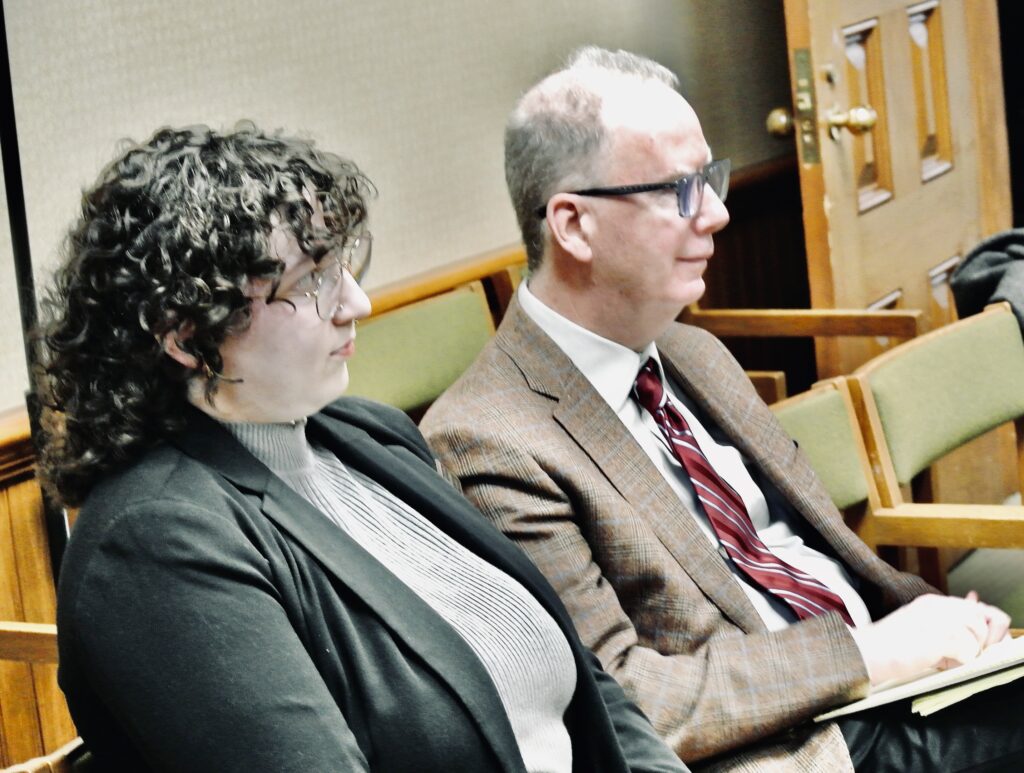The House Ethics Committee ruled Tuesday that state Rep. Alissandra Murray must recuse on votes related to abortion issues and the nonprofit paying the Manchester Democrat’s salary, an indirect rebuke to her questionable actions as a House member.
Murray is a co-founder and employee of the Reproductive Freedom Fund of New Hampshire (RFFNH). NHJournal reported in October that RFFNH lobbyist Josie Pinto was paying Murray’s salary so the progressive could serve in the House and influence legislation. And while Murray had voted on many pieces of legislation related to abortion issues of interest to RFFNH, she had never filed a conflict of interest disclosure.
The bipartisan Ethics Committee ruled the lawmaker’s votes on some abortion bills ran afoul of House conflict of interest rules and ordered Murray to recuse in the future. That was not the ruling Murray, who sought the advisory opinion, wanted to hear.

Rep. Alissandra Murray and attorney William Christie at House Ethics Committee hearing on December 5, 2023.
Murray’s attorney, well-connected Democratic lawyer William Christie, acknowledged the only reason his client sought the opinion was because of NHJournal’s reporting.
“Because of the article and controversy, Rep. Murray felt this is the best course,” Christie said. Christie is married to Democratic Executive Councilor and candidate for governor Cinde Warmington.
The committee voted five to one to tell Murray to recuse on all bills on which RFFNH lobbies. The one no vote came from Sen. Cindy Rosenwald (D-Nashua).
House members are required under ethics rules to either recuse themselves from voting on bills that could be seen as a conflict of interest, or to file a declaration of intent to vote in order to publicly disclose the potential conflict of interest. Despite several abortion bills before the legislature in the last session, Murray never filed a declaration of intent to vote.
Christie told the committee Murray did not think filing a declaration was necessary despite the full-time job with an organization that lobbies on particular abortion-related bills.
“Since this issue came to light, (Murray) reviewed with counsel and others and does not think a declaration of intent to vote is necessary,” Christie said.
Christie claimed during the hearing that Murray’s job with RFFNH has nothing to do with Murray’s elected position. But Pinto told The Nation magazine that Murray’s salary was part of a plan to get a pro-abortion advocate to be in the House.
“Together, we sort of developed this theory of change, which was like, ‘If we want to see the state we want, we have to get our people to run,’” Pinto told the magazine.
The article spelled out RFFNH’s plan to have a paid activist in the House.
“But there was a major obstacle in their way: New Hampshire’s Legislature pays a salary of just $100 a year. That’s fine for wealthy retirees but not for working-class activists. So Pinto hired Murray at the Reproductive Freedom Fund of New Hampshire, giving [Murray] a salary that would allow [Murray] to work in the Legislature while running the abortion fund’s social media accounts.”
Christie argued that since the RFFNH would not financially benefit from any of the abortion-related proposals considered, and since the organization is not primarily a lobbying group, Murray’s votes do not cross any ethical lines.
Committee Chair Edward Gordon did not appear to buy that argument in light of the fact the RFFNH did lobby for five abortion-related bills that Murray then voted on.
“I’m looking at it intuitively, and looking at it intuitively, I would say, ‘Geez, don’t I have a conflict here?’ Didn’t Rep. Murray say, ‘This is close; this is something I would have a concern with here if someone else did it’?”
Murray claimed to believe filing an annual financial disclosure form listing the RFFNH employment and salary — a form every House member with a job fills out — was notice enough.
“When I filled out the disclosure form, I thought that was me disclosing,” Murray said. “I didn’t see any clear conflict when I was voting on these bills.”
Pinto did not speak during the hearing but acknowledged to the committee through her attorney that, as RFFNH executive director, she did lobby on five bills, spending about $800 in total on those efforts.
The fact Murray’s employer, RFFNH, lobbied on any bill and spent any money was enough to create a conflict of interest, according to David Hess, a former state representative and committee member.
“The guidelines are pretty clear,” Hess said. “[Murray] is getting income from an organization that is lobbying.”
Christie said RFFPNH would not have been financially impacted by any of the bills for which Pinto lobbied since the organization maintains such a narrow mission. He also said Pinto spent a relatively low amount on only five bills.
But Hess said the fact that the group’s executive director lobbied on the bills showed Pinto considered the legislation important to the RFFNH mission. He also cited a recent committee opinion imposing recusal on a Republican.
Last summer, the committee told Rep. Deborah Hobson (R-East Kingston) that she would have to recuse herself on bills if she took a job with a conservative advocacy group. Hobson sought the advisory opinion while considering a job with Americans for Prosperity. The committee’s answer was Hobson should recuse herself from any bill that AFP lobbies for or against.
Hobson and Murray’s situation are nearly identical, Hess said, and the result should be as well.
“I see no distinction whatsoever between the two situations,” Hess said. “It’s an employee getting income from a firm engaged in lobbying. The money and time amount are irrelevant.”
A complete advisory opinion draft will be voted on at the committee’s next meeting.



